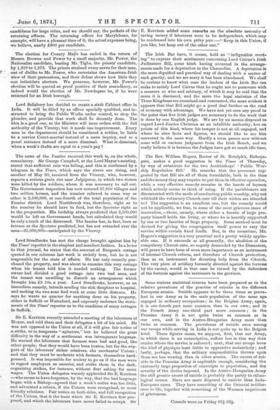Sir E. Kerrison recently attended a meeting of the labourers
of Borne, and told them and their delegates a bit of his mind. He was not opposed to the Union at all, if it will give fair notice of a strike, or to temperate "agitators," but he believed the great difficulty in the way of a settlement was intemperate language. He warned the labourers that farmers were bad and good, like other people; that they would have been beaten, but for the sup- port of the labourers' richer relatives, the mechanics' Unions ; and that they must be moderate with farmers, themselves hard- pressed. It was impossible for society to go on if the men were to regard employers as enemies, and strike them in the dark, organising strikes, for instance, without first asking for more wages. The Union delegates warmly applauded Sir E. Kerrison —who seems to have forgotten, by the way, that the bad language began with a Bishop—agreed that a week's notice was too little, and advocated a return, if the Unions were recognised, to more friendly relations. Fair notice on both sides, and full recognition of the Unions, that is the basis which Sir E. Kerrison first pro- posed, and which the labourers have never failed to accept. Sir
E. Kerrison added some remarks on the absolute necessity of Baying money if labourers were to be independent, which may be condensed into his own pithy pun :—" Keep in this Union, if you like, but keep out of the other one."


































 Previous page
Previous page